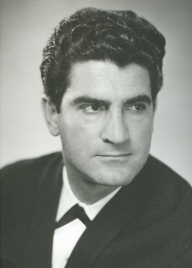Viguen
Thursday, August 13, 2020
Vigen or Viguen (born Vigen Derderian, November 1929 – 26 October 2003), known as "King of Iranian pop" and the "Sultan of Jazz", was an Iranian pop music singer and actor, well known throughout the Near East. Vigen sang both in Persian and Armenian.
Vigen was of Iranian-Armenian ethnicity and during the golden age of Persian pop (early 1970s) until the 1979 Islamic Revolution, many Iranian performers and celebrities—among them Delkash, Pouran, and Elaheh—yearned to be associated with him.
Vigen's innovative and upbeat style of music had a great influence on paving the way for a new genre of Iranian music, influenced by Western European and Latin American styles. His musical and performing talents soon captured the attention of many prominent Iranian lyricists and composers such as Parveez Vakili and Kareem Fakkour, and together they created some of Iran's most memorable songs.
Viguen was born into an Iranian-Armenian family of eight children in the western Iranian city of Hamadan. His father died of complications related to pneumonia when Viguen was only eight years old. His mother and older brother Zaven raised him after moving away from the family property due to a family disagreement. His older brother Karo was a well known Iranian poet and wrote the lyrics for Viguen's signature song, "Lala'ee" (Lullaby).
During World War II, the family moved to the northern city of Tabriz where local Azerbaijani nationalists declared the area a separatist republic, with the help of the occupying Soviet forces. This is where Viguen bought his first guitar from a Russian soldier and discovered his affinity for American, Italian and Spanish music and adopted many of those melodies for his songs with Persian lyrics that became some of Iran's most popular music to date.
In his mid teens, Viguen moved to Tehran and in 1951 he was hired to perform at the Café Shemiran, an upscale restaurant & bar on the northern outskirts of the capital city.
Equated to Elvis Presley by some fans in Iran, Viguen's debonair looks and his tall and athletic physique added to his appeal as Iran's first male pop star – particularly among young Iranian women at a time when ideas of emancipation and liberalism were taking hold in the 1950s and 60s. He was also one of the first Iranian entertainers to perform with a guitar.
Viguen moved to the United States in 1971 and settled in California. He would return to Iran yearly to do concerts and perform in Vegas-styled nightclubs. After the Islamic Revolution of 1979, he was exiled to the United States because pop music was no longer allowed in Iran. He celebrated the 50th anniversary of his career at the Hollywood Palladium in Los Angeles in February 2001.
Some of his most notable songs are "Baroon Barooneh" (It's Raining), "Asb-e Ablagh" (Thoroughbred Horse), "Mahtab" (Moonlight), Lala'ee (Lullaby), "Gol-e Sorkh" (Red Rose), "Ragheeb" (Rival), "Simin-bari", "Awazekhan" (The Singer) and "Del-e Divaneh" (Crazy Heart). More than 600 songs were recorded during his long career.





